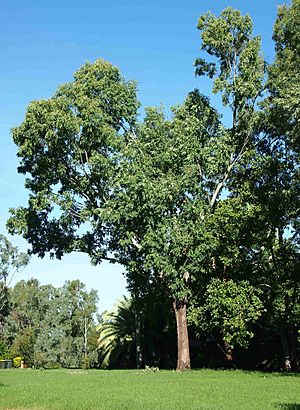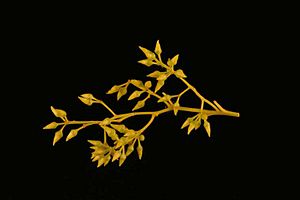Black ironbox facts for kids
Quick facts for kids Black ironbox |
|
|---|---|
 |
|
| Conservation status | |
| Scientific classification |
|
| Kingdom: | Plantae |
| Clade: | Tracheophytes |
| Clade: | Angiosperms |
| Clade: | Eudicots |
| Clade: | Rosids |
| Order: | Myrtales |
| Family: | Myrtaceae |
| Genus: | Eucalyptus |
| Species: |
E. raveretiana
|
| Binomial name | |
| Eucalyptus raveretiana |
|
| Script error: The function "autoWithCaption" does not exist. | |
Script error: No such module "Check for conflicting parameters".
The Black Ironbox (scientific name: Eucalyptus raveretiana) is a special type of Eucalyptus tree. It's a small to medium-sized tree. You can only find it in Queensland, Australia. This means it is endemic to that area.
It has rough, thick bark on its trunk and big branches. Higher up, the bark is smooth and light grey. Its leaves are shaped like a spear. The tree grows white flowers and small, round fruits.
Contents
About the Black Ironbox Tree
What Does it Look Like?
The Black Ironbox tree usually grows to be about 21 to 30 metres tall. It has a special woody swelling at its base called a lignotuber. This helps the tree regrow after fires.
The bark on the main trunk and large branches is thick and rough. It feels flaky and has deep cracks. This bark is dark grey. On thinner branches (less than 50 mm thick), the bark is smooth. It can be grey or cream-coloured.
Leaves and Flowers
Young Black Ironbox plants have egg-shaped leaves. These leaves are paler on the bottom. They are about 50 to 125 mm long and 17 to 55 mm wide.
Adult leaves are dull green on top and lighter underneath. They are mostly spear-shaped. These leaves are 80 to 172 mm long and 10 to 35 mm wide. They narrow down to a stalk called a petiole, which is 9 to 26 mm long.
The tree's flower buds grow in groups of seven. They are found at the ends of small branches. Each group of buds sits on a short stalk, 1 to 7 mm long. Each individual bud has its own tiny stalk, 1 to 4 mm long.
The mature buds are oval-shaped. They are about 3 to 4 mm long and 2 mm wide. They have a cone-shaped cap called an operculum. The Black Ironbox flowers are white. They bloom from December to March.
Fruits
After flowering, the tree produces woody fruits. These fruits are shaped like half a sphere (hemispherical). They are about 2 mm long and wide. The parts that release the seeds, called valves, stick out from the fruit.
How Was it Named?
The Black Ironbox was first officially described in 1877. A famous botanist named Ferdinand von Mueller wrote about it. He included it in his book Fragmenta phytographiae Australiae.
The scientific name raveretiana was chosen to honor a French public servant. His name was C. Raveret-Wattel.
Where Does it Grow?
You can find the Black Ironbox tree in forests and woodlands. It usually grows along creeks and rivers. Its natural home is in Queensland, Australia.
It grows in areas between Rockhampton and Ayr. You can also find it further inland, near rivers north of Duaringa.
Is it Protected?
Yes, the Black Ironbox is a special tree that needs protection. It is listed as "vulnerable" by the Australian Government. This means it could be at risk if we don't protect its habitat.
The Queensland Government also protects it under their nature conservation laws. One of the main dangers to this tree is when its habitat is disturbed. This can happen during timber harvesting. Another threat is a plant called rubber vine (Cryptostegia grandiflora). This vine can grow over and smother the young Black Ironbox trees.
 | Laphonza Butler |
 | Daisy Bates |
 | Elizabeth Piper Ensley |



